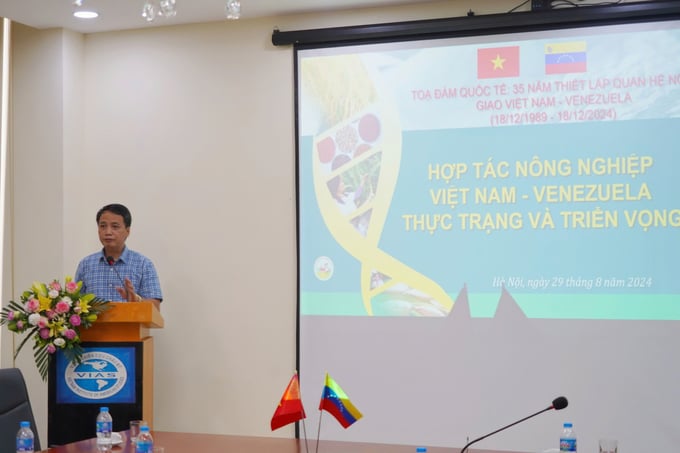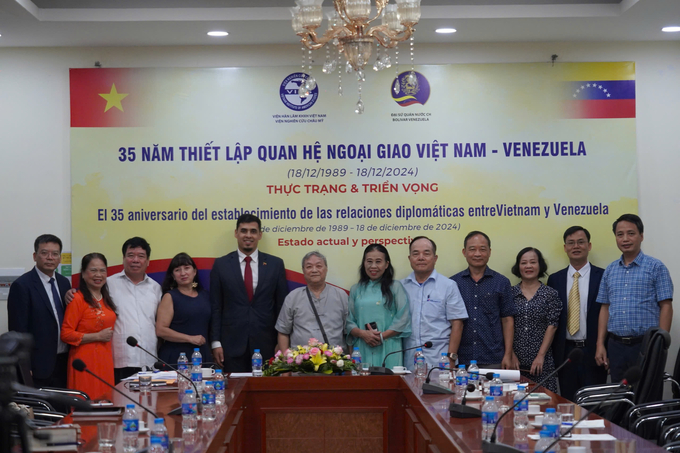October 16, 2025 | 11:08 GMT +7
October 16, 2025 | 11:08 GMT +7
Hotline: 0913.378.918
October 16, 2025 | 11:08 GMT +7
Hotline: 0913.378.918
On August 29, the Vietnam Institute of American Studies collaborates with the Embassy of the Bolivarian Republic of Venezuela in Vietnam to hold an International Forum on the “35th year of diplomatic relation establishment of Vietnam and Venezuela (1989 – 2024): Current situations and Prospect”.
Vietnam and Venezuela formally established diplomatic relations on December 18, 1989, and established the comprehensive partnership framework in May 2007. This partnership has resulted in numerous successful collaboration initiatives. The two parties have signed more than 50 cooperation agreements in a variety of disciplines, implemented a number of cooperation mechanisms, and engaged in bilateral cooperation projects, particularly in the areas of agriculture and aquaculture, with respect to the economy, trade, and investment.

Dr. Nguyen Xuan Dung, Deputy Director of the Center for Technology Transfer and Agricultural Extension, Vietnam Academy of Agricultural Sciences.
Dr. Nguyen Xuan Dung, Deputy Director of the Center for Technology Development and Agricultural Extension at the Vietnam Academy of Agricultural Sciences (CETDAE-VAAS), reported that Vietnam's agricultural projects in Venezuela have yielded numerous positive outcomes, including the development of rice varieties with high yields that have contributed to Venezuela's food security.
The two initiatives, the Project on Cooperation in Rice Production Development in Venezuela and the Project on Cooperation in Seafood Development in Venezuela were examples of agricultural cooperation between Vietnam and Venezuela from 2015 to 2019.
In the planning and design of three rice fields in the states of Guarico and Cojedes, as well as the planning and design of the Rice Research Center in Cojedes, Vietnam fostered Venezuela. Dr. Nguyen Xuan Dung disclosed that the Institute of Agricultural Research (INIA) of Venezuela and Vietnamese specialists collaborated to evaluate 20 rice varieties from Vietnam in three continuous rice crops from 2016 to 2018. The results defined and selected five rice varieties in 20 rice varieties of Vietnam: VIVE25 (OM2517), VIVE50 (IR50404), VIVE80 (OM8017), VIVE95 (OM9582), and VIVE96 (OM9605). The yield of these varieties was 1.5 to 2.5 times greater than that of the Venezuelan control. The two most notable varieties were VIVE80 (OM8017) and VIVE96 (OM9605), which produced yields of 10-11 tons/ha (fresh rice grain) during the testing process.

The Institute for American Studies in collaboration with the Embassy of the Bolivarian Republic of Venezuela in Vietnam organized a seminar to celebrate the 35th anniversary of diplomatic relations between the two countries.
FONDAS, INIA, and other organizations collaborated with Vietnamese cardes and specialists in Venezuela to provide training and instruction on rice cultivation techniques to hundreds of Venezuelan technical cardes and farmers. The rice project edited, published, and transmitted 500 documents on "Technical instruction in rice cultivation in Venezuela according to Vietnam's rice cultivation experience."
In the context of aquaculture cooperation and development, Vietnamese experts effectively implemented the white-leg shrimp culture technique of Vietnam in Venezuela, resulting in a 30% reduction in feed consumption and a reduction in the culture period from four months to three months. Venezuela highly valued the outcome, and the two parties reached an agreement to establish a white-leg intensified culture model that produces high-quality output, yields, and output. Nevertheless, the model establishment was suspended as a result of the security situation in the region.
Venezuela's agricultural production potential is substantial, according to a representative of VAAS. Nevertheless, the country is experiencing production challenges due to a lack of labor, a shortage of fertilizer material, and a lack of new technology. Venezuela is in need of Vietnam's assistance to bolster its agricultural development.
Dr. Nguyen Xuan Dung suggested that the two embassies continue to enhance agricultural cooperation in order to address the current food and food shortage in Venezuela.
He also suggested that the two parties promptly implement agricultural cooperation in the 2024-2030 period on the basis of signed documents, including the MOU on agricultural cooperation in the 2024-2030 period (MOU) signed by the Minister of Agriculture and Land of Venezuela and MARD on December 12, 2023 in Can Tho. Additionally, the contents of the Implementation plan on MOU of agricultural cooperation development between Vietnam and Venezuela, signed by INIA on April 18 in Caracas, should be implemented in accordance with the methodology that was implemented in the 2026-2029 period.
Additionally, VAAS and the authorities of certain Venezuelan states (Guarico, Monagas, etc.) are proposing to continue their collaboration in the development and expansion of Vietnamese rice varieties in Venezuela, with an emphasis on advanced rice cultivation. This collaboration will be necessary when the latter requires assistance.
Vietnam continues to transfer varieties and technical and technological processes of wet rice cultivation and beans that are adaptable to climate change and suitable for the commodity market. This delivers gen source (plant varieties) that are adaptable to climate change in order to reduce risks and develop sustainably.

Vietnam - Venezuela agricultural cooperation is considered a model towards ensuring food security for Venezuela in particular and the world in general.
Mr. Dung stated that the two countries must establish a series of favorable conditions and mechanisms to encourage Vietnamese and Venezuelan enterprises to collaborate in the development of rice production and other agricultural sectors. This should be done in conjunction with the guidance of VAAS and selected Venezuelan specialized units.
In order to sustain cooperation for an extended period, it is imperative that the enterprises of both parties be involved. Consequently, the two parties must exchange information regarding the investment and production regulations of their respective countries in order to provide the enterprises with the necessary information to facilitate cooperation. Particularly, Venezuela is encouraged to provide a comprehensive overview of its investment environment, payment mechanism, and investment incentives, with a particular emphasis on Vietnam.
Dr. Nguyen Cao Duc, Deputy Director Chief in Charge of the Vietnam Institute of American Studies, stated that Vietnam and Venezuela have been actively promoting trade cooperation and investments, each with their own assets. However, the results have not been comparable to their potential. The two-way total turnover is restricted, with an estimated 60 million USD in 2022 and a subsequent decrease to 31.5 million USD in 2023.
Particularly in bilateral trade relations between Vietnam and Venezuela, the majority of trade is conducted by one party, primarily Vietnam, to the other. The export turnover from Vietnam to Venezuela in 2022 was 56.8 million USD. One of the most notable aspects of this turnover is the export structure, which primarily consists of products that require preliminary preparation or are labor-intensive and require minimal labor skills.
Translated by Linh Linh

(VAN) Viet Nam continues to affirm its proactive and active role in regional cooperation on disaster risk management and climate change adaptation.
/2025/10/15/1539-2-180518_941.jpg)
(VAN) Ms. Mai Kieu Lien, Board Member and General Director of Vinamilk, has been honored by Fortune magazine (U.S.) in the Top 100 Most Powerful Women Asia 2025.

(VAN) The Ca Mau World Biosphere Reserve is a unique 'green home' that not only conserves biodiversity but also nurtures sustainable livelihoods for tens of thousands of coastal households.

(VAN) EU Deforestation-Free Regulation (EUDR) poses a major challenge but also offers an opportunity for Vietnam to restructure its coffee sector toward a more sustainable and professional model.

(VAN) Assoc. Prof. Dr. Mai Van Trinh emphasized that measuring greenhouse gas emissions and carbon storage provides the essential scientific foundation for Viet Nam to fulfill its emission reduction commitments.

(VAN) Khanh Hoa is resolutely implementing the second phase of vaccination and strictly applying detailed and synchronized biosecurity measures to prevent ASF disease outbreaks.

(VAN) Gene editing has emerged as a biotechnology breakthrough in many countries, including Vietnam. To enable broad adoption, Vietnam needs a timely, coherent, transparent regulatory framework that reflects real-world practice.